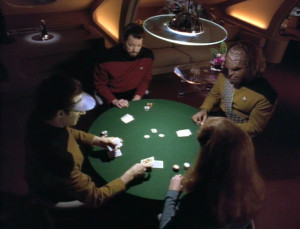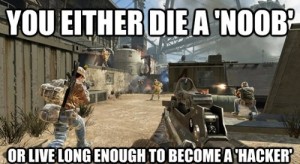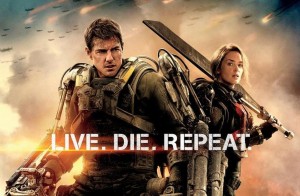Edge of Tomorrow, From A Gamer’s Perspective
by NorseGamer, HSM Publisher
Imagine if I told you that there’s a place where you could go to the movies and see Captain Jack Sparrow, Darth Vader, Storm, and Jules Winnfield all at the same time. No, seriously.
I’m not describing some bizarre Quentin Tarantino mashup. We’re talking about Mann’s Chinese Theatre.
I can’t even begin to describe how bizarre the human carnival is at this place. Hollywood Boulevard is already a human car-wash, a freak show mixture of tourists, lights, and shouting people. It’s not a place for quiet contemplation of the universe; it’s a place to see, up close and personal, our culture’s bizarre fascination with movie stardom. The heat, the noise, the constant humidity of all those people…it’s an experience you don’t forget. And it attracts all types; standing next to Lord Vader is an earnest young picketer, holding a sign with some generic “Repent Unto Jesus” ecclesiastical messaging. Next to him is another picketer, holding a sign that says, “SAURON STILL LIVES. BUT IT’S OKAY — SO DOES FRODO.”
Hollywood.
Normally, I avoid places like this. The sheer crush of humanity is difficult to deal with. But the Chinese Theatre does offer the mother of all IMAX 3D screens, and after spending more than a decade enjoying cinema on an outer island in Hawaii, the prospect of seeing a modern, properly-equipped theatre running the kind of spectacle that’s so important to the film industry’s survival was simply too good to pass up.
The film we chose? Edge of Tomorrow, starring Tom Cruise.
Well, you didn’t think we’d spend that kind of money to see some soft-lit BS film about emotions and handwringing, do ya? No.
Edge of Tomorrow is basically the ultimate video game movie. You find yourself thrust into a role you have no training for. You fight in a massive combat sequence. You get your ass kicked. Respawn, try again. Make it a little further, die again. Respawn again. Repeat ad nauseam.
Sound familiar?
From time to time, I’ve tried to get into first-person shooters. But the cold truth is that they’re made for a different type of gamer than I. These are people who obsessively play the same game, the same levels, over and over, to the point where they spawn in and immediately throw grenades along seemingly random vectors, knowing that their targets are the frequently-used choke points on the map.
It is the most ridiculous game of high-tech tag you’ll ever see. And people go deep with it. To an extent, this is due to the money being thrown at such endeavors; the first rule of economics is that people respond to economic incentive, and when you have real-world championships with serious money on the line, you’re going to attract gamers who choose to pursue that cash and thus raise their skills to a level no one else can really match except for their peers.
Here’s the thing, though: rehearsing moves and memorizing maps doesn’t really make you a better gamer, at least in my view. It of course improves your reflexes, and your overall proficiency with that particular game or games similar to it, but we’re still ultimately talking about pattern repetition. Which, to me, is boring. And if you take that same gamer and put them in an unfamiliar environment, their vaunted proficiency rapidly diminishes.

TNG’s “Cause and Effect” had more emotional tension in this one poker scene than “Edge of Tomorrow” had in the whole movie
This, then, is the issue I have with Edge of Tomorrow. Conceptually, it’s an interesting riff on the “man stuck in a time loop” trope, which has been used in other movies and TV series with great effectiveness. (Watch Bill Murray’s Groundhog Day or Star Trek TNG’s “Cause and Effect” to see two very different examples of this concept at work.) But Edge of Tomorrow feels oddly hollow, in the same way that a lot of FPS games feel hollow: beautiful to look at, but somehow failing to grip any real emotions.
At this juncture, you could probably criticize my opinion by pointing out that all video games are ultimately a matter of pattern repetition; it’s simply how they’re dressed up. And, to an extent, I agree with this: for as much as I pride myself on being an RPG powergamer, I certainly can’t hide the fact that that involves a lot of pattern repetition to build proficiency. I hold no particular animosity against those who play FPS games religiously (indeed, a couple of my friends are hardcore devotees to the altar of FPS mastery), because they’re having fun, and that’s what’s important.
Here’s the big difference for me, though: is the pattern repetition a means to an end, or an end unto itself?
In Edge of Tomorrow, the stakes really don’t ever change: save the world. There is a decent attempt at pulling in an emotional sub-plot by adding a desire to save a fellow soldier and potential love interest, but even that falls short, in much the same way that every single FPS game ever made is simply about mastering the pattern, with a little bit of story thrown in as a flimsy garnish to make you feel like you’re doing something that has some sort of deeper meaning. You never really find out anything about the film’s antagonists, which look like they were ripped off in whole from The Matrix. Nor does the film’s contrived final act and Hollywood ending really convey any sense of Cruise’s character’s journey; he is a far more capable soldier, yes, but ultimately that’s about all that’s changed.
Contrast this now with Groundhog Day — yeah, I know, it’s a comedy versus a sci-fi epic, but the trope is the same — and you have a completely different hero’s journey. Bill Murray’s character undergoes a fairly deep transformation, and we — through him — learn a hell of a lot about what’s actually important in life. The trope was merely the catalyst for the journey.
In much the same regard, while I don’t mind pattern-repetition grinding, it has to be towards a larger goal. Which is why I like RPGs so much; when done right, the pattern repetition is a means to an end, not an end unto itself. When you progress in a BioWare RPG, for instance, no matter what type of character build you create, you’re ultimately enveloped in a really deep and fantastic story. And the game’s mechanics are built around discovering all of that story’s nuances. The story is what stays with you; it’s what you take away from the experience and the time invested.
For me, personally, Edge of Tomorrow is an unintentional commentary on a big chunk of the video games industry which I’ve never really understood: the endless drive for more photorealistic graphics, more spectacle, more explosions, more grim-faced protagonists…and nothing underneath. Sadly, the film ends exactly where I want it to begin: with a genuine moment of emotional uncertainty between two people.
The movie industry has, in recent decades, carefully bled all but the most superficial level of emotional triggers needed for plot advancement out of modern cinema spectacle. And the end result are throwaway, formulaic, forgettable movies which generate huge grosses based on the quality of their effects (see the godawful Transformers films from Michael Bay to get an example of this), but ultimately leave you feeling hollow.
 If this sounds familiar, it’s because video games, at the AAA tier, are to a lesser extent becoming guilty of the same thing. And for both industries, nothing will ultimately change until we as an audience decide we’ve had enough razzle-dazzle and want something deeper to go with it. Spectacles will never go away — nor should they — but the most successful ones, be they games or movies, are those which remember to keep the humanity in the finished product. If you can’t quote a single line from the explosionfest you just saw (or played) — or, worse, you can’t even name any of the characters — then something’s horribly wrong, and it’s only a matter of time until there’s a fiscal reckoning as a result of this.
If this sounds familiar, it’s because video games, at the AAA tier, are to a lesser extent becoming guilty of the same thing. And for both industries, nothing will ultimately change until we as an audience decide we’ve had enough razzle-dazzle and want something deeper to go with it. Spectacles will never go away — nor should they — but the most successful ones, be they games or movies, are those which remember to keep the humanity in the finished product. If you can’t quote a single line from the explosionfest you just saw (or played) — or, worse, you can’t even name any of the characters — then something’s horribly wrong, and it’s only a matter of time until there’s a fiscal reckoning as a result of this.
Hollywood Boulevard, Edge of Tomorrow, and FPS shootfests. Lots of noise. Lots of visual splendor. But nothing to cherish.
Share
| Tweet |





 LinkedIn
LinkedIn Twitter
Twitter
Wow! I honestly thought this would potentially be a solid gam--I mean movie.
:/
:^/ I’ve noticed this trend, too. I believe Hollywood will continue favoring the production of shallow, flashy movies as long as the public continue favoring them at the box office. When deeper, thought provoking fare outsells the flashier stuff, Hollywood will shift back to producing deeper fare. We vote with our wallets, and Hollywood follows.
As for Transformers, their first movie offered a real treat in translating cartoon fare into photo-realistic CGI, composited with live action. This was what Auto-Bots would look like if they actually existed. It’s no surprise that many people chose to see them just out of nostalgia’s sake, as I did.
There were also a few surprises that would not have worked outside of the Transformer universe. For example, I recall the human teenager Sam standing in his yard, talking with his parents through their upstairs bedroom window, while the robots each awkwardly hide from the grownups’ view.
There were also sober bits of dialogue that stay with you. When one comments “Humans don’t deserve to live. They’re always at war with each other.” Optimus Prime counters “They deserve to decide for themselves,” and “Were we so different?”
:^/ Their second movie, however, kept and repeated so many elements from the first one that it felt very much like watching the first one again. And the third offered only a few more differences than did the second. Hollywood is scared to change a good thing too much.
I found their latest offering to be a bit disappointing. They did good by adding new story ideas to the mix, but the characters were far too cliched and predicable. Maybe the strategy was to make the robots more convincing by making the humans more wooden, or something.
For my tastes, I need to know who these people are and somewhat identify with them before I’ll care what happens to them. That’s called characterization, and it’s something Hollywood is drifting too far away from.
I rarely pay to go to the movies anymore because they have so little to offer for me. The same goes for video games, I wouldn’t even own anything newer if it weren’t for PS Plus giving it to me for free. The exception being Final Fantasy 14 of course.
As for movies I can recommend one to people if they want to see one that was extremely well written and played out, August Rush. It is the best thing I have seen come out of Hollywood in years, and no one swears a lot or has to die to make it so.
The swearing we have to put up with in many movies is one reason I rarely watch them anymore, don’t writers know how to write anymore and get a point across without it? I am beginning to wonder.
You make some excellent points Norse, and though I play an RPG that requires a lot of repetition at times it is a means to an end and has its rewards.
Unfortunately it’s about making money. Just about everything is about repeating and slogging in the games world. Same games, levels and missions over and over again. But they are popular and make money. Plus we as users want the next biggest thing. Look at older films they relied on characters because the rest was flimsy sets, dodgy effects and a lot cheesy moments that gave a feel good factor. Now we get an explosion on screen the next explosion has to be bigger and better. We don’t want superman saying ” I’m sorry mr president next time I won’t let you down ” and hanging from the ceiling by string. We want a dark moody batman, not a holy kapow. And we want to see these two heroes fight as well. It’s all about easy wins. When you get past the AAA film and game money making juggernaut. You get some great independent games and films that don’t have AAA budgets. That’s the biggest difference between now and the past is the levels below AAA are so much better than they ever were.